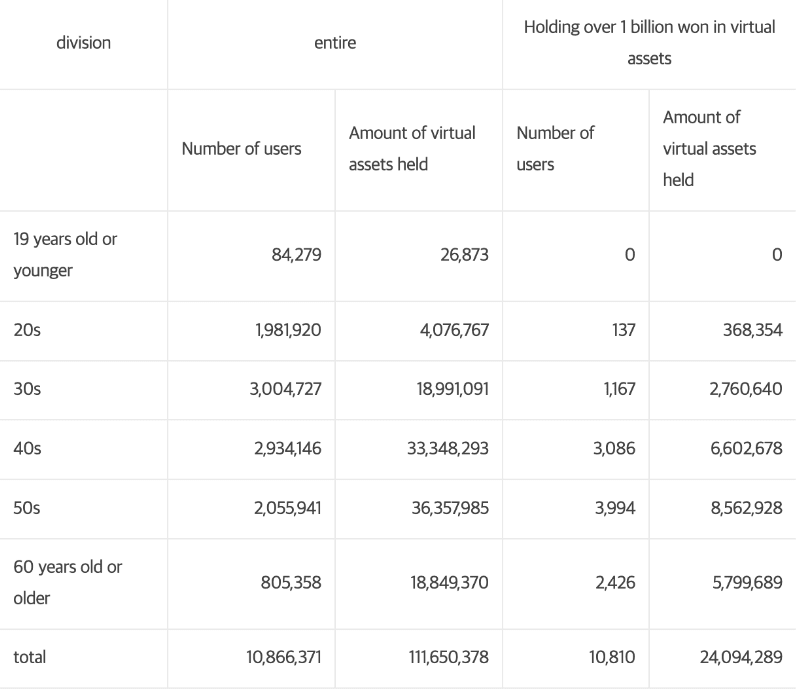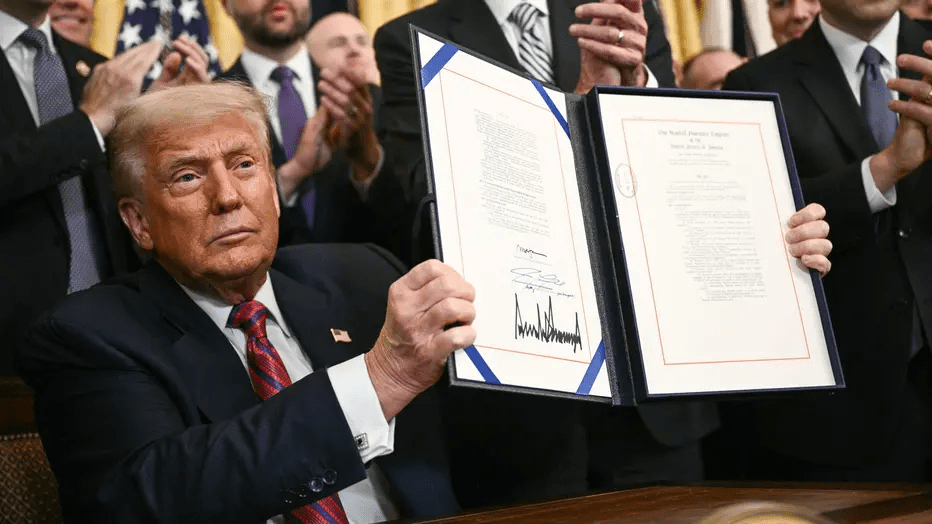Currently, over 10,000 South Koreans hold cryptocurrencies valued at over 750,000 USD, with young investors dominating, despite being the smallest demographic. Individuals in their 20s have an average holding of 2.69 billion won.
Currently, there are over 10,000 cryptocurrency investors in South Korean domestic exchanges holding more than 1 billion won (750,000 USD) in digital assets, with young investors in their 20s having the highest average holdings despite being the smallest demographic.
According to the Korea Times, data shows that one-fifth of South Koreans actively trade cryptocurrencies.
Young investors have the least number of holdings.
Data submitted by the Financial Supervisory Service to lawmakers shows that as of August 5, over 10,810 users across Korea's five largest exchanges (including Upbit, Bithumb, Coinone, Korbit, and GOPAX) held assets exceeding 1 billion won.
The average balance of these cryptocurrency millionaires is 2.23 billion won, approximately 217 times the overall average balance of users at 10.27 million won.
Demographically, the largest number of investors are in their 50s, totaling 3,994, followed by those in their 40s, totaling 3,086.

However, despite having only 137 investors in their 20s, their average holding amounts to 2.69 billion won, far exceeding investors in other age groups.
The total number of cryptocurrency traders in South Korea has reached 10.86 million active accounts, accounting for about 20% of the country's 51.7 million population.
These users collectively hold digital assets worth 111.6 trillion won. Although Upbit accounts for 52% of the market share among the top five exchanges, it holds 76% of millionaire investors.
The government is accelerating cryptocurrency reforms that are favorable to business.
President Lee Jae-myung's government has designated the development of the cryptocurrency market as a 'national priority task' in its five-year national management plan, prioritizing stablecoin regulation and institutional trading reform.
The Presidential State Council has listed 'building a digital asset ecosystem' as one of 123 key government goals, marking unprecedented regulatory support.
In fact, in July this year, the Indian government began reclassifying cryptocurrency trading companies as 'venture capital firms,' granting them tax breaks, subsidies, and state-supported financing that had been denied since 2018.

The Ministry of SMEs and Startups has proposed amendments to include virtual asset service providers under venture capital status, which could reverse the previous policy of categorizing cryptocurrency companies with gambling establishments.
Financial regulatory authorities have lifted restrictions on institutional cryptocurrency investments while preparing to approve South Korea's first spot cryptocurrency ETF.
The Financial Services Commission has proposed measures for spot cryptocurrency ETF implementation and a regulatory framework for won-based stablecoins to be implemented in the second half of 2025.
Lee Jae-myung promised to launch a digital currency pegged to the won for business and international trade during his campaign, and since then, many financial institutions have submitted applications for stablecoin trademarks.
Leading banks and IT companies are developing business plans related to cryptocurrency, anticipating opportunities brought by advanced payment platforms.
However, regulatory crackdowns in specific areas continue. In the first month, 27,600 investors borrowed 1.5 trillion won, with 13% facing forced liquidation due to market volatility, after which the Financial Services Commission suspended all cryptocurrency lending services.
Despite regulatory uncertainties, young investors continue to drive adoption.
According to a recent report by Cryptonews, compared to traditional U.S. tech stocks, South Korean investors in their 20s and 30s are increasingly favoring cryptocurrency investments, with cryptocurrency-related stock investments rising from 8.5% in January to 36.5% in June, then dropping to 31.4% in July.
The Korea International Financial Center attributes this shift to the expansion of stablecoin opportunities following the passage of the U.S. (GENIUS Act).

Retail investment in major U.S. tech stocks decreased from an average of 1.68 billion USD per month from January to April to just 260 million USD in July.
The younger demographic allocates an average of 14% of their financial assets to cryptocurrencies, with over half of South Koreans aged 20-59 having trading experience in cryptocurrencies.
Similarly, survey data from June shows that 27% of respondents currently hold cryptocurrencies, with the average holding per investor reaching 13 million won (9,547 USD).
Early adopters typically start with Bitcoin and gradually shift to altcoins and stablecoins as their experience increases, with 60% starting their investments during the bull market in 2020.
As cryptocurrency technology becomes increasingly popular in the country, tax authorities have also intensified their efforts to seize crypto assets from tax evaders. Jeju City recently completed an investigation of 2,962 residents and seized 230 million won worth of cryptocurrency from 49 individuals.
The Gangnam district of Seoul recovered over 144,000 USD through similar law enforcement actions, using artificial intelligence tools to identify hidden crypto assets.
The cryptocurrency tax will be suspended until January 2027, creating a grace period during which capital gains tax will not be collected.
Political leaders have warned that the Democratic Party may implement a virtual asset tax starting in 2027 to ensure tax revenue under expansionary fiscal policies.